The Right Track
Jamaica isn’t shy about its primacy in track and field. Reflecting the colors of the national flag, there’s a green, gold and black “track” painted on the floor of the capital city’s international airport terminal. And just before you approach the track, you see a painting of history-making sprinter Shelly-Ann Fraser-Pryce hanging on the terminal’s walls. In the portrait, she’s depicted wearing one of her many vibrant hairstyles—in this case blue-green box braids.
In real life, crowned by a more subdued hairstyle of pin-straight black hair that flows past her waist, the petite sprinter reciprocates the appreciation of her home country. Fraser-Pryce has just finished a long day of shooting for this story—yet despite the hours she’s spent whisking in and out of outfits, she can still enthusiastically detail what she loves about the island that raised her. “We have so much pride in our country,” she says. “It’s a community. I’m not talking about one area. The ability as a country to come together, to support our own, is unmatched.”
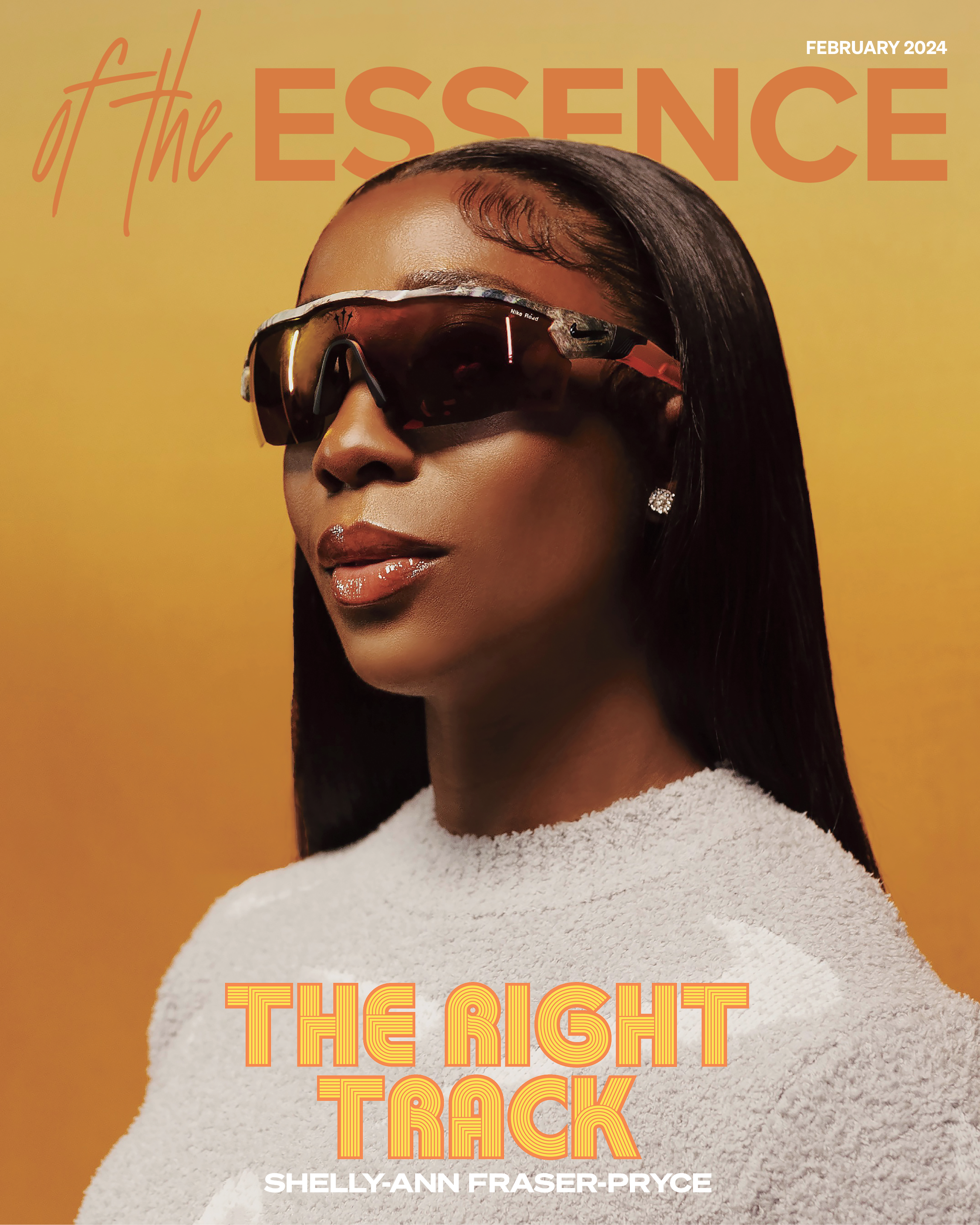
The sun has already set by the time we sit down to speak—but the sprinter’s energy lights up the room, a photography studio in Kingston. “Everything that we have here is authentic,” she continues. “If Jamaicans love you, they love you. If they don’t like something, they don’t like something. It doesn’t matter how small we are. From small things come big actions. Being from this small island, we don’t have all the resources that we think we need, but we make it work. We have a way of using what we have and maximizing that.” Her sentiment is basically a Black proverb across the globe; and Fraser-Pryce embodies it fully.
Despite being an underdog in the 2008 Beijing Olympics, Fraser-Pryce surprised the world when she bested favorites in the 100m race, surpassing their finish times and becoming the first Black Caribbean woman to win Olympic gold in that category. After the race, which has now become her signature event, Fraser-Pryce learned a lesson that would carry her for the rest of her storied career: Never underestimate yourself. “I undervalued myself going into Beijing,” she recalls. “I just wanted to make the finals. But when I crossed the line in first place, from that moment, I’ve never undervalued myself. I’m not just here for participation. I’m here to win.”
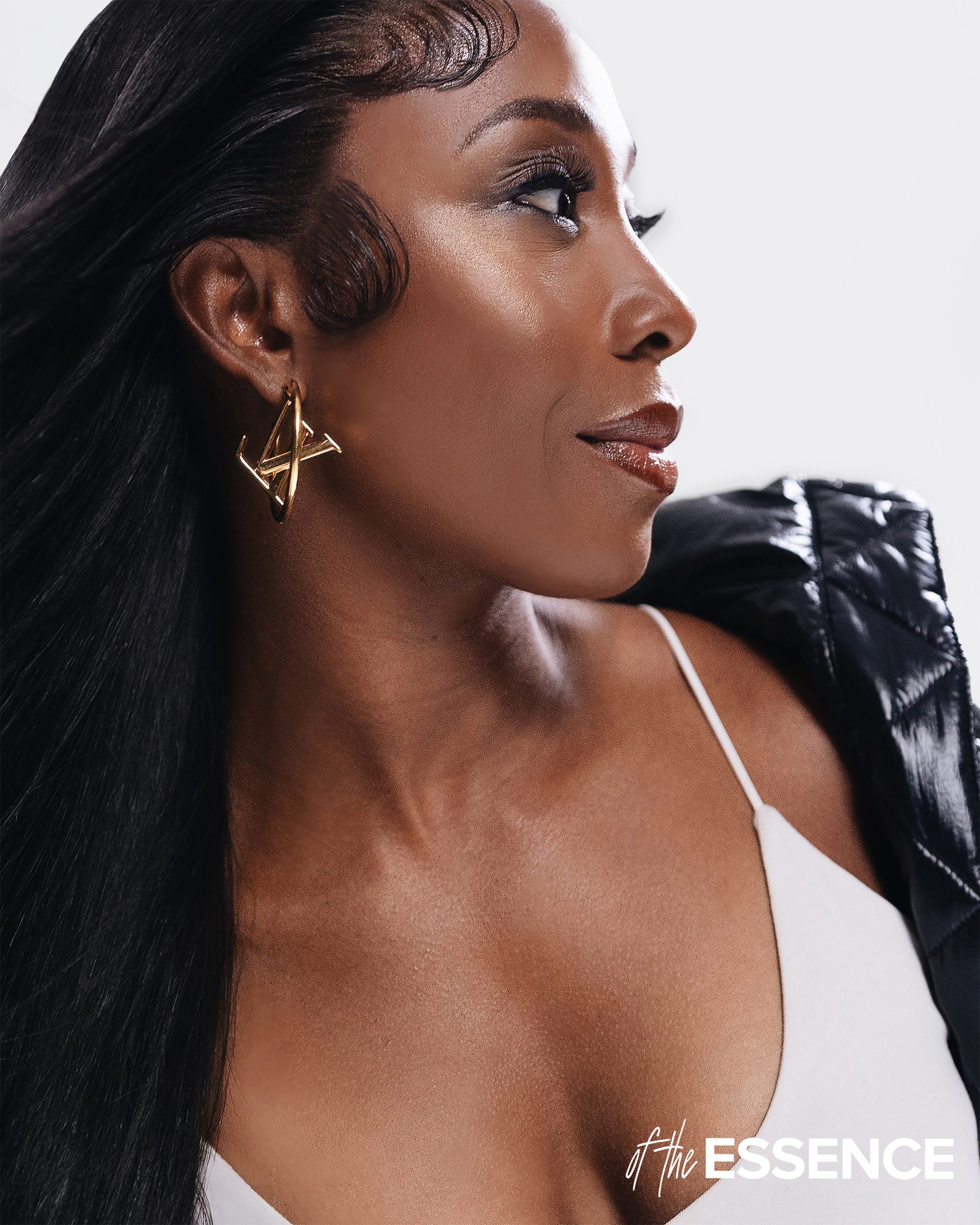
That competitive spirit revealed itself when she was a child. “I grew up with all boys,” she says. “It was always my brother and my cousins, always outside.” When the boys were flying kites, she was flying kites. When they were going to the river, she was going to the river. “You’re rolling tires down the street? I want to be inside the tire,” she recalls, laughing. “Being fierce for competition is not necessarily about anyone else. It’s just me.”
Beyond the familial inspiration, she says, her circumstances also shaped her path. “Being from the inner city, that’s how I survived,” she explains. “When I look back, I can see [that my environment] cultivated the person who I am. I’m strong. Determined. I’m persistent.”
Promising American sprinters often perfect their craft on high-tech tracks, but many upstart Jamaican runners have trained on dirt. During the COVID lockdowns, Fraser-Pryce returned to a dirt track, which took a toll on her body. Still, she went on to win a world championship in 2022—making her the first athlete, male or female, to win five titles in an individual running event.
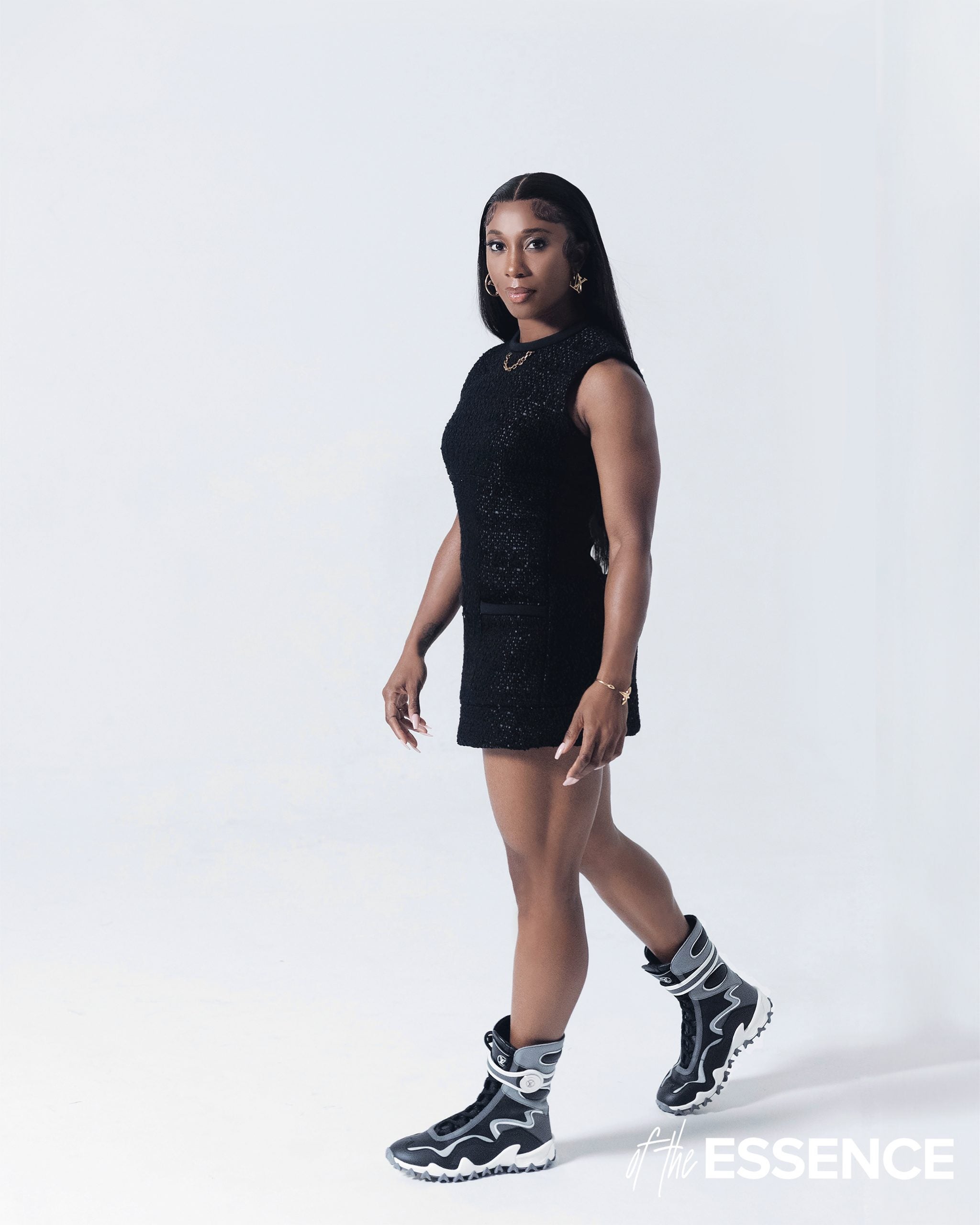
Fraser-Pryce’s dominance is almost supernatural. She has run at an elite level for over 15 years, almost half of them as a mother. Much is made of her age and her steadfast athleticism after giving birth, but her achievements cannot be overstated. The 37-year-old, who delivered her son, Zyon, in 2017, continues to surpass expectations. The same year she won the 2022 world title, she also won at the Monaco Diamond League—and became the first woman to run under 10.7 seconds six times in one season. Nearly two years later, she’s still excited about the sport.
“There’s not a day I’m getting up to go practice and I’m like, ‘I’m over this,’” Fraser-Pryce says. Her decision to retire after the 2024 Paris Olympics isn’t due to the restraints of age or the desire to stop racing; she’s essentially forcing herself to retire to spend more time with her family. “My son needs me,” she says. “My husband and I have been together since before I won in 2008. He has sacrificed for me. We’re a partnership, a team. And it’s because of that support that I’m able to do the things that I have been doing for all these years. And I think I now owe it to them to do something else.”
For now, though, she’s focused on training for Paris, which she says is about “pushing boundaries” and “showing people that you stop when you decide. I want to finish on my own terms.” Her training regimen for Paris includes pacing herself after dealing with an injury—which hampered her chances for three straight world titles at the 2023 world championships in Budapest, where she was bested by her teammate Shericka Jackson and by U.S. track star Sha’Carri Richardson. But even an injured Fraser-Pryce still placed among the best in the world.
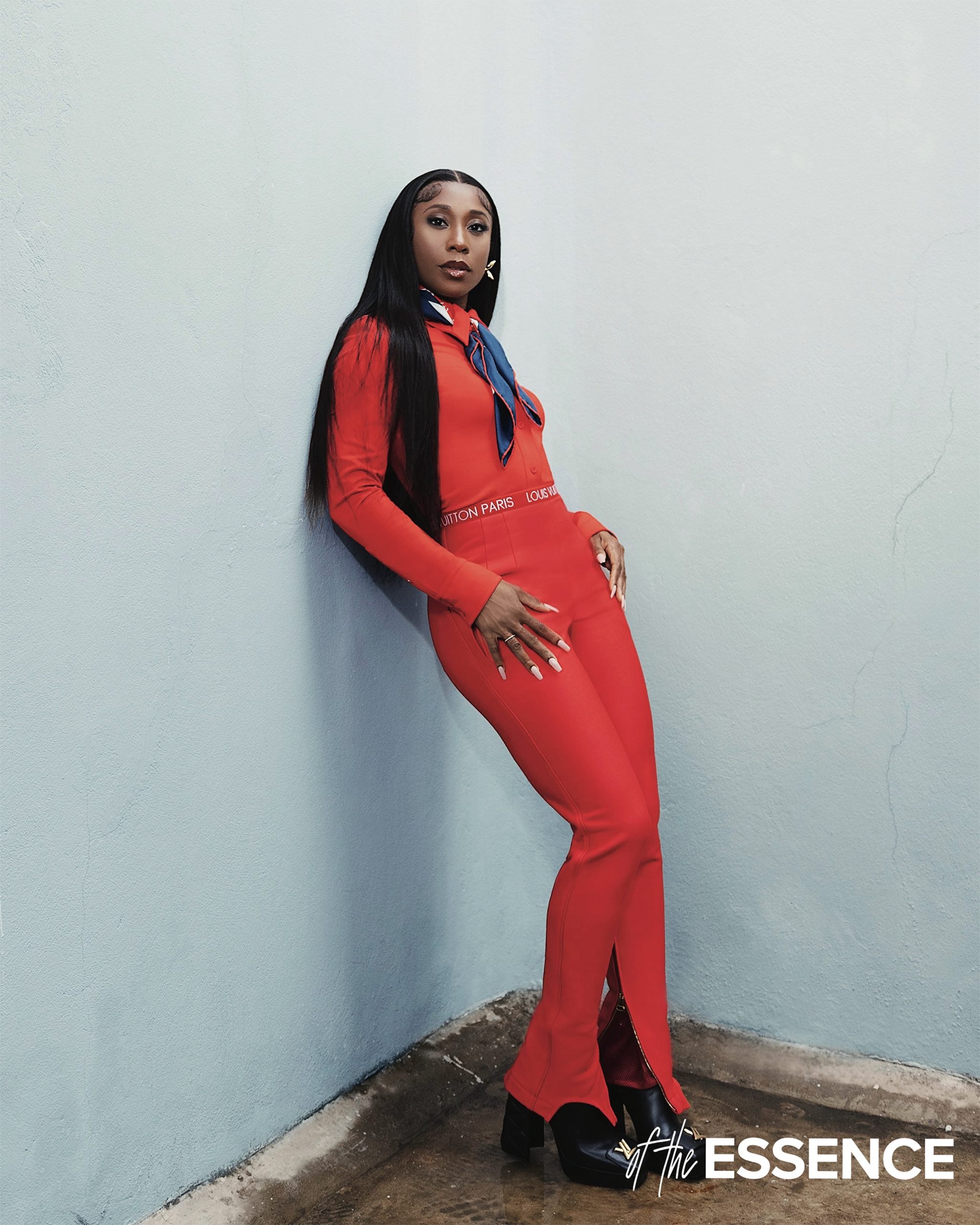
Her stellar track career may not have happened at all without people who saw her promise early on. “I remember going to school, and a lot of times I didn’t tell people where I lived—because people tend to put you in a box based on where you’re from,” she recalls. “But I found a community of people who believed in me.”
At about 14 years old, she went to the Penn Relays in Philadelphia with her school’s track team and gained a mentor—a woman named Jeanne Coke, who presided over an association that helped fund young athletes’ trips to sporting competitions. “It was her generosity, and the generosity of so many others, that left a mark on me,” Fraser-Pryce says. “I was blessed to have people who looked out for me and kept me on track.”
Before Coke’s involvement, the young sprinter hadn’t envisioned running as a lucrative career. Initially, she’d thought she would become a flight attendant. But Fraser-Pryce—nicknamed “Pocket Rocket” for her combination of speed and petite stature—took off in a different way. Her track prowess has since elevated her into the pantheon of Jamaican track and field stars who have kept the country at the top of the global ranks of sprinters.
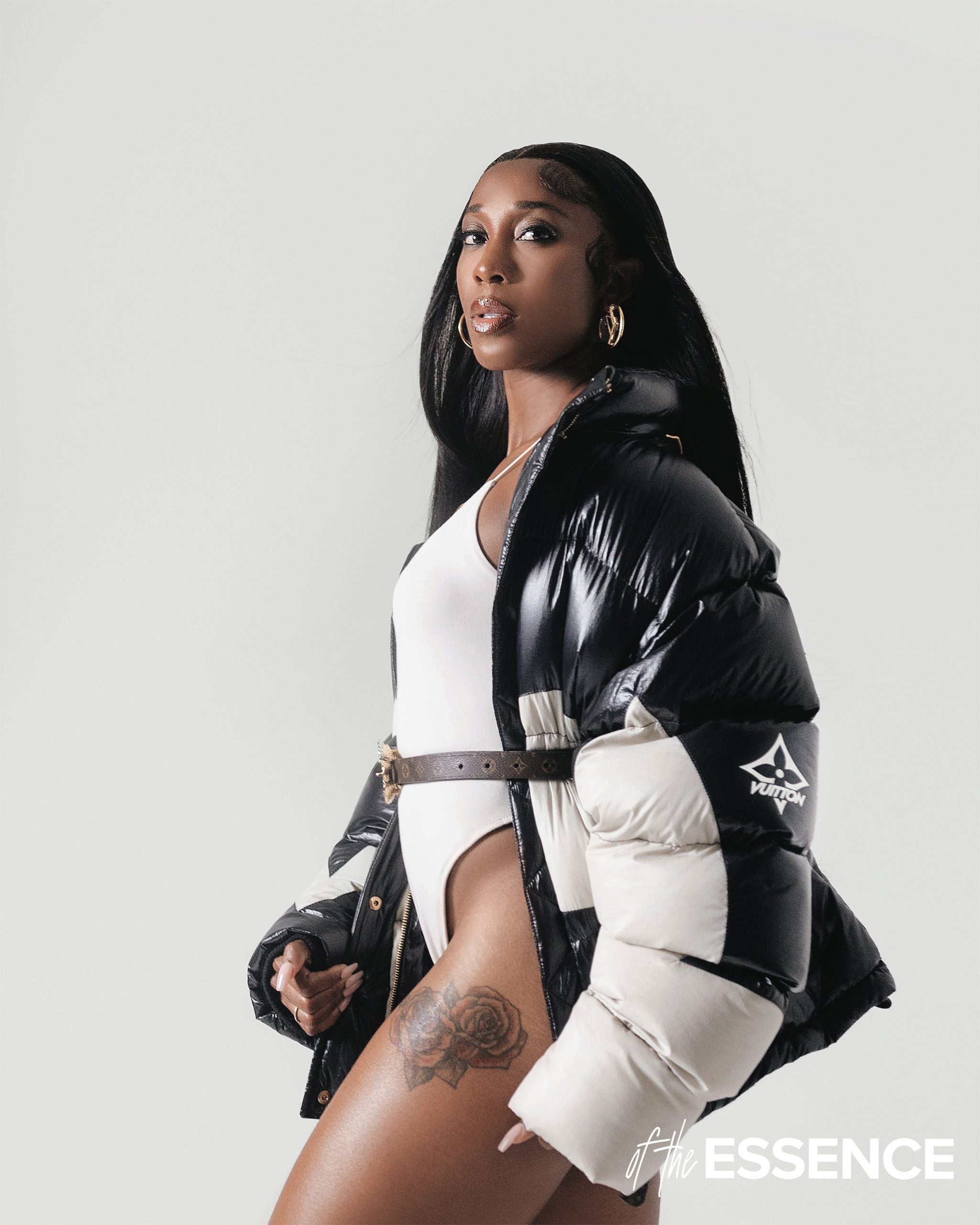
Though Jamaica’s dirt tracks may have been tough on some of its athletes, they have produced powerhouses like Usain Bolt, Shericka Jackson, Veronica Campbell Brown, Elaine Thompson- Herah and Merlene Ottey—in fact, more track superstars per capita than almost any other nation in the last two decades. And Fraser-Pryce is intentional about watering that ground. Throughout her career she’s been steadily directing resources to Jamaican youth, pouring into other young athletes across the country.
Through her Pocket Rocket Foundation, which she founded in 2012 to support student athletes, she has leveraged her relationships with Nike to invest in athletic spaces in the Kingston community where she was born and raised. “I didn’t start the foundation because it looks good,” she says. “I started it because I wanted to give student athletes the opportunity to believe that there is so much more for them. So it has been a passion of mine to see, so far, 73 student athletes pass through the foundation.” Her organization also helps students financially, so that they’re “not thinking about where the food is coming from, where tuition is coming from—so they can focus on being in school, as well as on their sport.”
In addition, as a founding member of Nike’s Athlete Think Tank, she has implored the company to invest in the hometowns of athletes that have made its logo globally recognized. As a result of her efforts, Nike has brought Internet connectivity to her community and supported her philanthropic activities, among other initiatives.
“You can have an impact, and it’s important to show people that you can’t be selfish,” she says. “It’s not enough that we step on a track and we win medals. You have to think about the next generation that’s coming after you, and give them the opportunity to also dream—and dream big.”
PRODUCTION CREDITS:
Hair: Lakayda Puddon using Puddon Plus Sweet Products
Makeup: Tonisha Kong using Nars, Givenchy & Fenty Beauty
Photography Assistants: Onari Cowan & Djuvane Armstrong
Stylist Assistant: Kirsy Lovett
Tailor: Kathleen PedroHall
Production Coordinator: Lo Watkis
Production Assistant: Zara Holmes
Shot at Hugh Wright Studio
FASHION CREDITS, spread 1: Louis Vuitton clothing and accessories.
Spread 2: Louis Vuitton clothing and accessories.

